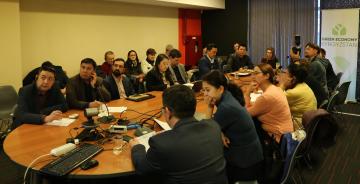GGKP News

Land is an essential part of Kyrgyzstan’s national economy, contributing to a wide range of economic activities, including tourism, agriculture and livestock. About 70% of the country’s pasture lands, however, are facing some degree of degradation as a result of overgrazing and unsustainable land management. To address this issue, the government has committed to a set of voluntary targets to combat land degradation and included agriculture as one of the key priorities in its recently adopted National Green Economy Programme (2019-2023).
The issue was highlighted at a roundtable discussion at Green Economy Week 2019, where experts shared the results of a pilot project in Kyrgyzstan’s Suusamyr Valley that aims to achieve green growth through land restoration and sustainable management. The project is supported by a joint effort between the Green Growth Knowledge Partnership (GGKP) and GIZ’s Economics of Land Degradation (ELD) initiative, in cooperation with the American University of Central Asia (AUCA), National Statistics Committee of the Kyrgyz Republic and the GIZ Kyrgyzstan office. A similar project to restore terrestrial natural capital for green growth is underway in Rwanda.
The project has been designed to demonstrate how natural capital value could increase by adopting sustainable use and management of pastureland towards green growth and implementation of the UN Sustainable Development Goals (SDGs). This is being done by assessing land cover and land use change and valuing the ecosystem services of the pasture land, and by developing experimental physical and monetary land accounts according to the System of Environmental-Economic Accounting (SEEA) Central Framework in order to provide useful information for decision-makers.
At the roundtable, a representative from Kyrgyzstan’s Ministry of Economy said that the ongoing project would add significant value to the country’s effort to implement its National Green Economy Programme. Sun Cho, a research consultant with GGKP, highlighted the work of the GGKP Expert Working Group on Natural Capital, including a scoping paper on natural capital policy use cases. “In over 300 use cases that we reviewed, only few reported its impact on policy-making. This encourages more ex-post impact analyses of natural capital use cases,” she said.
Dr. Kanat Sultanaliev, Head of the Tyan-Shyan Policy Center of AUCA, presented on the project’s preliminary results. His team conducted an analysis on vegetation and land use changes in Suusamyr over the last 15-20 years using satellite images. The analysis estimated the growth of productivity in the valley whereas the expansion of shrubs was considered as a deterioration of pasture resources by livestock breeders. The results also showed that carbon sink services in the area had the highest monetary value and the provision of feedstock second – demonstrating that pastureland in the valley provides both market and non-market ecosystem services.
Based on the preliminary results and identified ongoing restoration initiatives, the project team will work closely with stakeholders to develop clear policy scenarios to be assessed for cost and long-term benefit of their implementation. The project will also assess a pathway of sustainable use of pasturelands such as reduction in livestock number while increasing the quality of livestock and elimination of pasture degradation caused by non-edible shrub species. Eventually, maps developed, data collected and monetary value assessed from this task will contribute to building indicators on land cover change and land cover by land use in order to establish an experimental land accounts in accordance with the SEEA framework for land.
The final results of the project will be presented at a national policy dialogue on land and the SEEA to be held in early 2020.
***
About the GGKP Natural Capital Expert Working Group
The GGKP Working Group on Natural Capital explores state-of-the-art methods, models, data and tools to achieve its three goals of pushing forward the knowledge frontier around natural capital and green growth; mainstreaming natural capital in global green growth activities; and supporting stronger implementation of natural capital commitments in national economic plans. The group is comprised of 24 experts from across GGKP’s partner institutions, each with at least 10 years of experience working with natural capital. For more information, see About the Natural Capital Working Group.
About the Economics of Land Degradation (ELD) Initiative
The Economics of Land Degradation (ELD) Initiative aims to transform global understanding of the economic value of productive land based on both market and non-market values, and to improve stakeholder awareness for socioeconomic arguments to improve sustainable land management, prevent the loss of natural capital, preserve ecosystem services, combat climate change, and address food, energy, and water security.
